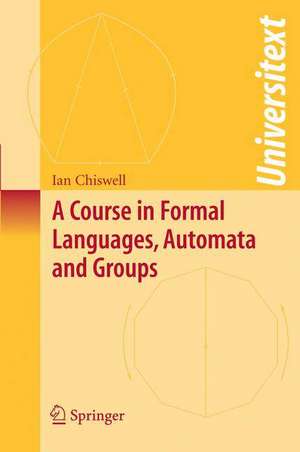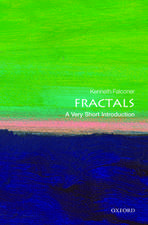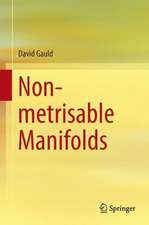A Course in Formal Languages, Automata and Groups: Universitext
Autor Ian M. Chiswellen Limba Engleză Paperback – 6 feb 2009
Din seria Universitext
- 13%
 Preț: 353.48 lei
Preț: 353.48 lei -
 Preț: 418.67 lei
Preț: 418.67 lei -
 Preț: 465.61 lei
Preț: 465.61 lei -
 Preț: 371.98 lei
Preț: 371.98 lei - 17%
 Preț: 394.41 lei
Preț: 394.41 lei -
 Preț: 356.77 lei
Preț: 356.77 lei - 17%
 Preț: 364.56 lei
Preț: 364.56 lei - 15%
 Preț: 543.75 lei
Preț: 543.75 lei - 15%
 Preț: 497.21 lei
Preț: 497.21 lei -
 Preț: 634.38 lei
Preț: 634.38 lei -
 Preț: 396.53 lei
Preț: 396.53 lei - 17%
 Preț: 431.50 lei
Preț: 431.50 lei - 13%
 Preț: 355.51 lei
Preț: 355.51 lei -
 Preț: 360.07 lei
Preț: 360.07 lei - 17%
 Preț: 365.34 lei
Preț: 365.34 lei -
 Preț: 358.44 lei
Preț: 358.44 lei - 15%
 Preț: 553.33 lei
Preț: 553.33 lei - 17%
 Preț: 364.81 lei
Preț: 364.81 lei -
 Preț: 673.45 lei
Preț: 673.45 lei - 15%
 Preț: 509.58 lei
Preț: 509.58 lei - 17%
 Preț: 427.32 lei
Preț: 427.32 lei - 17%
 Preț: 426.76 lei
Preț: 426.76 lei - 17%
 Preț: 427.68 lei
Preț: 427.68 lei - 20%
 Preț: 569.54 lei
Preț: 569.54 lei - 19%
 Preț: 429.21 lei
Preț: 429.21 lei - 17%
 Preț: 369.06 lei
Preț: 369.06 lei - 15%
 Preț: 737.46 lei
Preț: 737.46 lei - 13%
 Preț: 389.95 lei
Preț: 389.95 lei -
 Preț: 487.96 lei
Preț: 487.96 lei - 20%
 Preț: 628.22 lei
Preț: 628.22 lei -
 Preț: 372.86 lei
Preț: 372.86 lei -
 Preț: 319.07 lei
Preț: 319.07 lei -
 Preț: 379.86 lei
Preț: 379.86 lei -
 Preț: 445.88 lei
Preț: 445.88 lei -
 Preț: 382.36 lei
Preț: 382.36 lei - 15%
 Preț: 533.72 lei
Preț: 533.72 lei - 15%
 Preț: 496.02 lei
Preț: 496.02 lei - 15%
 Preț: 474.82 lei
Preț: 474.82 lei -
 Preț: 389.70 lei
Preț: 389.70 lei -
 Preț: 484.08 lei
Preț: 484.08 lei - 15%
 Preț: 469.48 lei
Preț: 469.48 lei - 15%
 Preț: 643.48 lei
Preț: 643.48 lei -
 Preț: 415.02 lei
Preț: 415.02 lei - 15%
 Preț: 602.25 lei
Preț: 602.25 lei - 20%
 Preț: 510.24 lei
Preț: 510.24 lei - 15%
 Preț: 588.37 lei
Preț: 588.37 lei -
 Preț: 381.59 lei
Preț: 381.59 lei -
 Preț: 489.87 lei
Preț: 489.87 lei -
 Preț: 493.89 lei
Preț: 493.89 lei
Preț: 381.98 lei
Nou
Puncte Express: 573
Preț estimativ în valută:
73.10€ • 75.52$ • 60.84£
73.10€ • 75.52$ • 60.84£
Carte tipărită la comandă
Livrare economică 25 martie-08 aprilie
Preluare comenzi: 021 569.72.76
Specificații
ISBN-13: 9781848009394
ISBN-10: 1848009399
Pagini: 168
Ilustrații: IX, 157 p. 30 illus.
Dimensiuni: 155 x 235 x 9 mm
Greutate: 0.27 kg
Ediția:2009
Editura: SPRINGER LONDON
Colecția Springer
Seria Universitext
Locul publicării:London, United Kingdom
ISBN-10: 1848009399
Pagini: 168
Ilustrații: IX, 157 p. 30 illus.
Dimensiuni: 155 x 235 x 9 mm
Greutate: 0.27 kg
Ediția:2009
Editura: SPRINGER LONDON
Colecția Springer
Seria Universitext
Locul publicării:London, United Kingdom
Public țintă
ResearchCuprins
Preface.- Contents.- 1. Grammars and Machine Recognition.- 2. Recursive Functions.- 3. Recursively Enumerable Sets and Languages.- 4. Context-free language.- 5. Connections with Group Theory.- A. Results and Proofs Omitted in the Text.- B. The Halting Problem and Universal Turing Machines.- C. Cantor's Diagonal Argument.- D. Solutions to Selected Exercises.- References.- Index.
Recenzii
From the reviews:
"This short work by Chiswell … covers formal languages, automata theory, and the word problem in group theory. This content is bound together by the unifying theme of what is known as Church’s thesis, which states that any desirable definition of computability should coincide with recursiveness. … Several appendixes serve as homes for … distracting proofs of results needed in the main body of the text, or for solutions to selected instances of the abundant exercises. Summing Up: Recommended. Academic readers, upper-division undergraduates through researchers/faculty." (F. E. J. Linton, Choice, Vol. 46 (11), 2009)
"This short work by Chiswell … covers formal languages, automata theory, and the word problem in group theory. This content is bound together by the unifying theme of what is known as Church’s thesis, which states that any desirable definition of computability should coincide with recursiveness. … Several appendixes serve as homes for … distracting proofs of results needed in the main body of the text, or for solutions to selected instances of the abundant exercises. Summing Up: Recommended. Academic readers, upper-division undergraduates through researchers/faculty." (F. E. J. Linton, Choice, Vol. 46 (11), 2009)
Textul de pe ultima copertă
Based on the author’s lecture notes for an MSc course, this text combines formal language and automata theory and group theory, a thriving research area that has developed extensively over the last twenty-five years.
The aim of the first three chapters is to give a rigorous proof that various notions of recursively enumerable language are equivalent. Chapter One begins with languages defined by Chomsky grammars and the idea of machine recognition, contains a discussion of Turing Machines, and includes work on finite state automata and the languages they recognise. The following chapters then focus on topics such as recursive functions and predicates; recursively enumerable sets of natural numbers; and the group-theoretic connections of language theory, including a brief introduction to automatic groups. Highlights include:
A solutions manual is available to instructors via www.springer.com.
The aim of the first three chapters is to give a rigorous proof that various notions of recursively enumerable language are equivalent. Chapter One begins with languages defined by Chomsky grammars and the idea of machine recognition, contains a discussion of Turing Machines, and includes work on finite state automata and the languages they recognise. The following chapters then focus on topics such as recursive functions and predicates; recursively enumerable sets of natural numbers; and the group-theoretic connections of language theory, including a brief introduction to automatic groups. Highlights include:
- A comprehensive study of context-free languages and pushdown automata in Chapter Four, in particular a clear and complete account of the connection between LR(k) languages and deterministic context-free languages.
- A self-contained discussion of the significant Muller-Schupp result on context-free groups.
A solutions manual is available to instructors via www.springer.com.
Caracteristici
Most books on formal languages and automata are written for undergraduates in computer science; in contrast, this book provides a rigorous text aimed at the postgraduate-level mathematician with precise definitions and clear and succinct proofs. The book examines the interplay between group theory and formal languages, and is the first to include an account of the significant Muller-Schupp theorem. Includes a clear account of deterministic context-free languages and their connection with LR(k) grammars. A complete solutions manual is available to lecturers via the web. Includes supplementary material: sn.pub/extras Request lecturer material: sn.pub/lecturer-material












